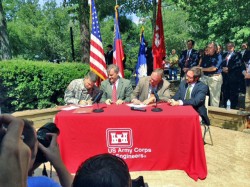Agreement Signed for Savannah River Water Study
After years of delays, both South Carolina and Georgia state lawmakers have agreed to contribute funding for a major million-dollar study of the Savannah River Basin.
Wednesday’s Savannah River Caucus Summit ended with the signing of an intergovernmental agreement to fund the study.
Georgia Governor Nathan Deal and South Carolina Governor Nikki Haley were on hand to witness the signing. They were joined by U.S. Army Corps of Engineers Savannah River District Commander Colonel Thomas J. Tickner
Deal said it’s important that both states continue to work together.
“We value your friendship. We value your cooperation. And we truly believe that both states that we represent have the opportunity to take advantage of what has been provided to us by God and by nature and that is the great Savannah River and the Basin that surrounds it,” Deal said. “But we know that in order to do that, we have to preserve it. We have to protect it, and we have to be responsible with the resources that have been allocated to us.”
Deal cited his experiences dealing with the ongoing Lake Lanier water discussions with Alabama and Florida and said praised the foresight of lawmakers in both states for beginning talks before ordered to by the courts.
Meantime, Governor Nikki Haley also praised the summit and the efforts of state lawmakers to work together.
Haley said while South Carolina may be in competition with Georgia in some areas, the two states must work together when it comes to saving the resources of the Savannah River.
“When you look at the water issues that we’re both dealing with in both states, the reason why I so appreciate you all getting together now is that we don’t need to wait until we have a crisis to deal with it,” Haley said. “What we do need to do is have a business plan; always knowing that we are ready for whatever happens to either one of our states, knowing that when one state is in need, the other is going to be there.”
Just before signing the study agreement, Colonel Tickner said the study will come in two phases.
“The result of this interim study is designed to study our most recent drought contingency plan,and will be based on the most recent drought record in the basin, which you all lived through from 2007 – 2009,” Tickner said. “Ultimately, the results of this part of the study will answer two pressing  questions: how long can we reduce the outflows at Thurmond Dam during drought conditions and how long can these minimum outflows be sustained before significant damage to the economies and environment.”
questions: how long can we reduce the outflows at Thurmond Dam during drought conditions and how long can these minimum outflows be sustained before significant damage to the economies and environment.”
Tickner said the first portion of the study should last over a year.
Tickner said the second phase will be the full comprehensive study, which he said will provide data and help make recommendations on future water management.

